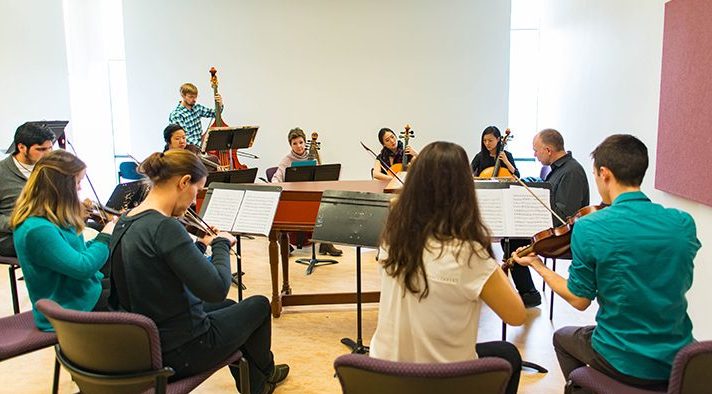The Master of Music in Historical Performance Practice offers students advanced training in early music, balancing theoretical study with rich opportunities in solo, chamber, and orchestral performance.
Students in this program enjoy expert instruction in vocal and instrumental performance, and have access to a wide array of string, wind, and keyboard instruments. In addition to coursework in the theory of historical performance and music history, students can perform in a range of different ensembles, including the Baroque Mentorship Orchestra, a collaborative ensemble of students and professionals led by director Alexander Weimann.
Entrance to the MMus in Historical Performance Practice is based upon your admission portfolio (including a pre-screen video) and an in-person audition. We encourage artist-teachers seeking to advance their studies to apply.

Baroque Mentorship Orchestra, Alexander Weimann, Director.
Principal artists
Paul Luchkow, baroque violin and viola
Solie Stratkauskas, baroque flute
Andrew Clark, natural horn
Katrina Russell, baroque bassoon
Matthew Jennejohn, baroque oboe and recorder
Curtis Foster, baroque oboe and recorder
Maryse Legault, chalumeau
Jeremy Berkman, sackbut
Alexander Fisher, sackbut and Renaissance winds
Prerequisites
- Excellent performing ability, with experience in early music preferred
- B.Mus. degree or equivalent
- Strong foundation in music history and theory
Thesis
The thesis will consist of one solo recital and one lecture- or ensemble-recital.
Curriculum
You must complete a total of 34 credits in
- 520A Introduction to Music Research - 3 credits (Ref. 1)
- 557 Early Music Ensemble - 4 credits (Ref. 2)
- 593A Music Performance - 6 credits (Ref. 3)
- 548 Historical Performance Practice - 3 credits (Ref. 4)
- Seminar in Early Music History - 3 credits (Ref. 5)
- Related Arts of Music Electives - 9 credits (Ref. 6)
- Thesis - 6 credits
- Music 520A must be taken in the first term of graduate study. Students who have had a similar course previously may be exempted from this requirement; please see the Student Advisor or chair of the Graduate Committee. If exempted, students may substitute 3 elective credits.
- Early Music Ensemble should be taken in both years of residency. Eligible students may be considered for membership in the Baroque Orchestra Mentorship Programme.
- Music 593A is to be taken in the first year of study only. Students shall register in Music 549, which includes second-year lessons, beginning in the summer session following the first year of study, and remain registered in it through the completion of the program.
- Music 548 is to be taken in the first year of study; concurrent registration in Music 557 is expected.
- Normally Music 523, 524, or 525.
- Electives shall normally be courses at the 500 level, although courses at the 300- and 400-level to a maximum of 6 credits may be included with approval. Courses below the 300 level may not be counted toward graduate level credit. Students may enroll in 500-level seminars in Music History, Music Theory, and/or Ethnomusicology with the permission of the instructor.